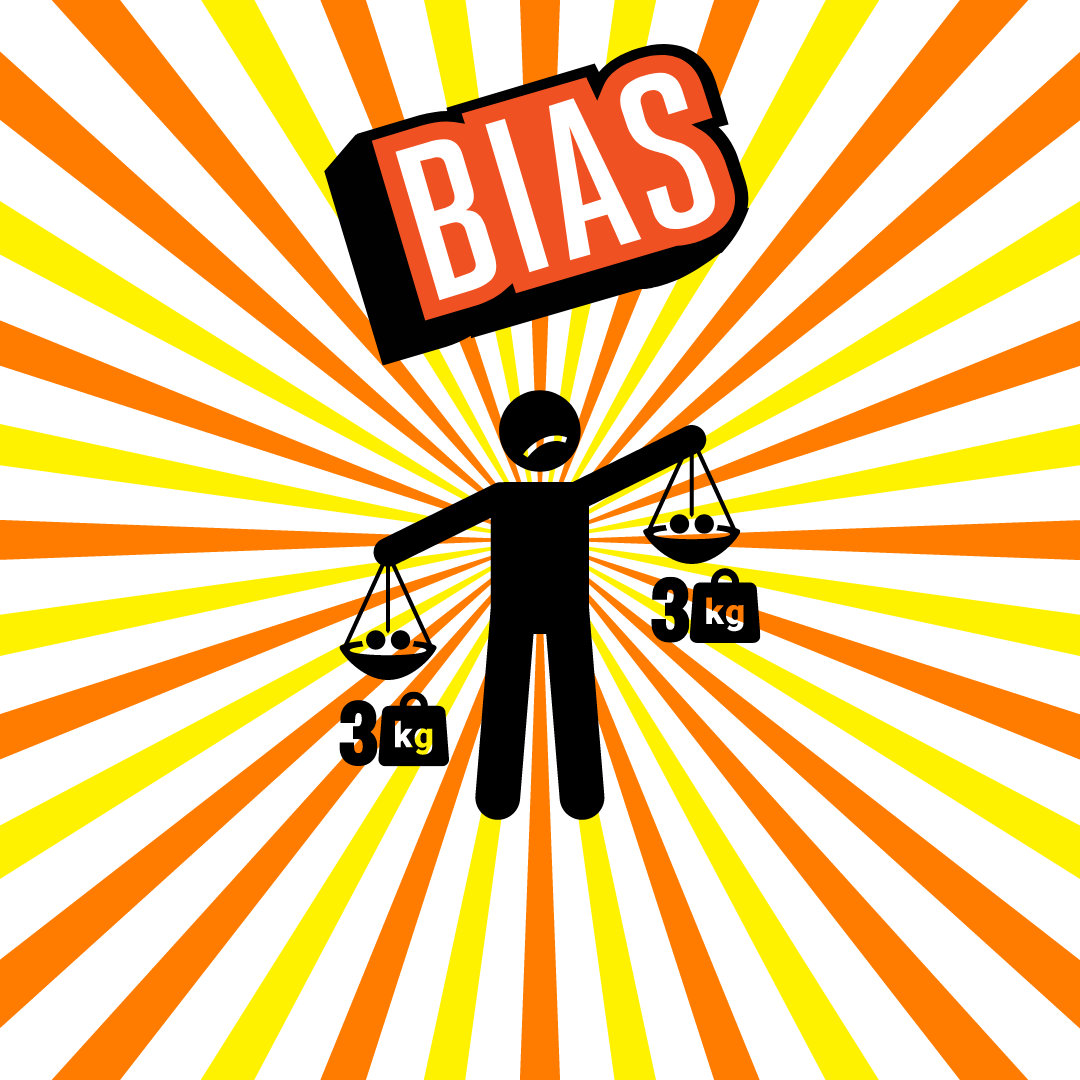Bias
Definition
Bias refers to a tendency or inclination that favors one perspective, group, or outcome over another, often in an unfair or prejudiced way. It can also refer to a preference or predisposition that affects objectivity. As a noun, it describes the prejudice or slant itself; as a verb, it means to influence someone or something in a particular direction.
Parts of Speech
- Noun
- Verb
Pronunciation
American and British English
- IPA Pronunciation: /ˈbaɪəs/
- Respelling: BY-uhs
The pronunciation of "bias" is the same in both American and British English.
Etymology
The word "bias" originates from the Old French "biais," meaning "slant" or "oblique." It entered English in the 16th century, initially used to describe an inclination or slant in sports and gaming, particularly in the game of bowls. Its meaning evolved over time to include predispositions and partiality in various contexts.
Derivatives
- Biased (adjective)
- Unbiased (adjective)
- Biasing (verb)
- Biasness (noun)
- Overbias (noun, rare)
Synonyms
- Prejudice
- Favoritism
- Slant
Antonyms
- Impartiality
- Objectivity
- Neutrality
Usage
The term "bias" is frequently used in contexts involving media, research, social issues, and individual decision-making. Biases can be conscious or unconscious and often influence judgments, actions, and opinions. In statistics and research, "bias" refers to a systematic error that skews results. In textile arts, bias describes the diagonal direction of fabric, known as the "bias cut."
Related Terms
- Prejudice: An unfair judgment or opinion formed without knowledge or reason.
- Stereotype: An oversimplified image or idea of a particular type of person or thing.
- Objectivity: The quality of being impartial or unbiased.
Detailed Definitions
Noun
- A tendency or inclination that favors one side over another: Refers to partiality or predisposition that may affect impartial judgment.
- Example: "The report showed a clear bias towards certain policies."
- An error that skews statistical results: In research and statistics, it denotes a systematic deviation that affects accuracy.
- Example: "Sampling bias can distort study findings."
- The diagonal direction of a fabric: In textiles, it describes the diagonal orientation of fabric, often used in garment-making.
- Example: "The dress was cut on the bias for a better fit."
Verb
- To influence in a particular direction: Refers to causing someone to have a particular inclination or prejudice.
- Example: "Her experiences biased her view on the topic."
bias



🇨🇳 Mandarin (Simplified Chinese)
- 偏见 - "prejudice"
IPA: /pjɛn˨˩ tɕjɛn˥/
English Respelling: pyen-jyen - 偏斜 - "skewness, slant"
IPA: /pjɛn˨˩ ɕjɛ˥/
English Respelling: pyen-she
🇮🇳 Hindi
- पूर्वाग्रह - "prejudice"
IPA: /pʊɾʋɑːgɾəh/
English Respelling: poorv-aagrah - झुकाव - "inclination, tilt"
IPA: /d͡ʒʱʊkaːʋ/
English Respelling: jhukav
🇪🇸 Spanish
- Prejuicio - "prejudice"
IPA: /pre.xu.'di.θjo/ or /pre.xu.'di.sjo/
English Respelling: pre-hoo-dee-thyo or pre-hoo-dee-syo - Sesgo - "skew, slant"
IPA: /'ses.ɡo/
English Respelling: ses-go
🇫🇷 French
- Préjugé - "prejudice"
IPA: /pʁe.ʒy.ʒe/
English Respelling: preh-juh-zhe - Biais - "skew, slant"
IPA: /bja/
English Respelling: bee-ah
🇸🇦 Modern Standard Arabic
- تحيز - "prejudice"
IPA: /taħi:z/
English Respelling: tah-heez - انحياز - "inclination, tilt"
IPA: /inhijaːz/
English Respelling: in-hee-ahz
🇧🇩 Bengali
- পক্ষপাত - "prejudice"
IPA: /pɔkʃopat/
English Respelling: pokkho-pat - বাঁক - "slant, tilt"
IPA: /baŋk/
English Respelling: bangk
🇷🇺 Russian
- Предубеждение - "prejudice"
IPA: /prʲɪdʊˈbʲɛʐdʲɪnʲɪjə/
English Respelling: pree-doo-bezj-dee-nee-ye - Скос - "slant, tilt"
IPA: /skos/
English Respelling: skos
🇵🇹 Portuguese
- Preconceito - "prejudice"
IPA: /pɾekõˈsejtu/
English Respelling: preh-kon-sey-too - Viés - "skew, slant"
IPA: /ˈvi.ɛs/
English Respelling: vee-es
🇮🇩 Indonesian
- Prasangka - "prejudice"
IPA: /prɑˈsɑŋ.kɑ/
English Respelling: pra-sang-ka - Miring - "slant, tilt"
IPA: /miˈriŋ/
English Respelling: mee-ring
🇩🇪 German
- Vorurteil - "prejudice"
IPA: /foːɐ̯ˈʔʊɐ̯taɪ̯l/
English Respelling: fohr-oohr-tail - Verzerrung - "skew, distortion"
IPA: /fɛɐ̯ˈt͡sɛʁʊŋ/
English Respelling: fair-tzehr-oong
🇯🇵 Japanese
- 偏見 - "prejudice"
IPA: /heŋ.keŋ/
English Respelling: hen-ken - 傾斜 - "slant, tilt"
IPA: /kei.ɕaː/
English Respelling: kay-shah
🇻🇳 Vietnamese
- Định kiến - "prejudice"
IPA: /ɗɪ̌ˀŋ kîənˀ˧/
English Respelling: ding kien - Nghiêng - "tilt, slant"
IPA: /ŋiəŋ˧˥/
English Respelling: nghien
🇰🇷 Korean
- 편견 - "prejudice"
IPA: /phjʌn.ɡʌn/
English Respelling: pyeon-geon - 기울기 - "tilt, slant"
IPA: /ɡi.ul.ɡi/
English Respelling: gi-ool-gi
🇹🇷 Turkish
- Önyargı - "prejudice"
IPA: /œnjaɾɯ/
English Respelling: on-yaruh - Eğim - "slant, tilt"
IPA: /eɟim/
English Respelling: edjim
🇵🇰 Urdu
- تعصب - "prejudice"
IPA: /ta'sub/
English Respelling: ta-sub - جھکاؤ - "tilt, slant"
IPA: /d͡ʒʱʊkɑːʊ/
English Respelling: jhukau





